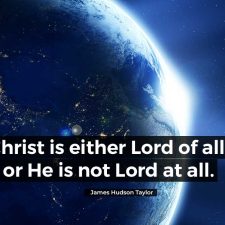[Matthew] Hey there. I’m Matthew Schoenherr, this is Levaire, and today, our guest is the author of “Finding Full Assurance of Faith: The New Covenant in Three Dimensions.” Bill Alderson is currently an associate pastor for Greater Grace World Outreach in Baltimore, Maryland. He and his wife have six children, 10 grandchildren, and live in Havre de Grace, Maryland. Welcome, Bill.
[Bill] Great to be with you, Matt, looking forward to our conversation.
[Matthew] Yeah. Bill, what drove you to write “Finding Full Assurance of Faith”?
[Bill] It was a long process. I’ve been studying the Word of God pretty intensely for, well, probably 40 years. About 15 years ago, 16 years ago, God started to reveal some things to me that I’d not read before in any other place, particularly as it relates to the new covenant. They were insightful things, and it just kind of led me into a deeper study. I was relying on some isogogic materials that really opened the door, opened up my mind to realities as these gospels in particular were being written, who they were being written to, and what was going on at the time that they were, that they were accounting for.
All of a sudden, it became clear to me that there was an underlying story—particularly in the gospel of John—there’s an underlying story here that’s not on the surface, you have to dig underneath. But once you do, you start to realize there’s something more going on here that brings into each believer a fullness in the relationship. This is really what God was leading me into.
It was a progressive thing, where He’d give me a season where He’d give me a lot of stuff. And then I’d have to set it aside, and then I’d pick it up again. And then I’d set it aside, and then I’d pick it up again. Never really knowing exactly how it was going to conclude. And it wasn’t until maybe six months ago that things started gel as far as, “Oh, this is how it’s supposed to end. This is what it’s supposed to look like, as a book.”
So actually, started talking to you and to others just to get some counsel on how to go about getting a book published. And here I am today. It’s done. It’s out there. I don’t like the word “proud” from a spiritual perspective, but I am proud of it in the sense that it, I believe it communicates what God wanted me to say.
So here we are. It was a long ongoing process. By the way, since I’ve written it, it’s like, now there’s more. It’s like, when He gives you something, then He says, “Okay, now you’ve got this. Now I’m going to build on that.” And I think our walk with God is kind of like that, where every day, the day before you had something, and now that becomes foundational for something else. He’s constantly building you in a process. Psalm 25:9 says, “The meek will He teach in the way.” This idea of meekness being open to hear the voice of God, let Him teach you, and then it’s a progressive thing that ultimately, it never ends. It doesn’t end until we’re in heaven, and even then, I think we’ll continue to learn more, particularly about the quality of God’s love.
[Matthew] Yes, yes. Amen to that. Now, I gotta bring you back for a second because you used a word that’s probably over a lot of heads: “isogogic”.
[Bill] Isogogics.
[Matthew] Can you expand on that just quickly?
[Bill] Yeah. The isogogics are the background of what is taking place. It’s inside information about who, you know what, when Jesus said something, what did they actually understand Him to mean? So you have to look at the context of the Hebrew mindset of His day, or who He’s communicating to. And to you get a bigger picture of actually what He is trying to deal with in a particular way.
One of the books that was really foundational for me was called the “Life and Times of Jesus the Messiah” by Alfred Edersheim, who was a 19th century scholar. He just brings out all kinds of special things that you wouldn’t read in most commentaries, that really kind of took me on this journey.
[Matthew] Yay. Nice. All right, so tell us a little more about yourself. How has your understanding of the Christian life changed as you’ve studied over the years?
[Bill] Well, it’s becoming more and more and more personal. As God gives me insights that are, as I study what other people have written before me, because I’m trying to glean from their lives, but then God says, “No, but I’m gonna give you something that you’ve never read before.”
The relationship with God, being able to hear the voice of God clearly. And for me, it happens most often when I’m studying the scripture. The Word of God is a means of God communicating heart-to-heart. He’s communicating to our hearts. And as we study, as we meditate, I think meditation is a critical part of our relationship with God, it’s not only do I read a verse and think about it, but then, okay, so what does this mean to me?
How do I apply this in a practical way in my life? And so, it’s a journey. It’s like “Pilgrim’s Progress”. Most people have at least heard of “Pilgrim’s Progress”, John Bunyan. You’re going from one city, one place to another, God’s taking you on this journey. And every city has implications for the next one.
So, it’s like there’s a process. And that’s really what God has taken me on, this amazing journey where I now see things, and He’s giving me more insights. It’s like I’m becoming comfortable being out on the end of the plank, if you know what I’m saying.
[Matthew] I do.
[Bill] He put you out there, He puts you out there, and you say, “Nobody else is here and I’m all alone.” He does that because He has a unique relationship with me, just as He does with everyone. And He wants to develop that relationship. And as we press into Him, as we draw near to Him, “You draw near to Me, I’ll draw near to you.”
That principle, everything expands, because now possibilities are endless, because you’re now outside of your own limitations. As a human being, we have very specific limitations, and each one of us has our own strengths and weaknesses and things that kind of hold us back.
But nothing is impossible with God. So you connect with Him and now you’re kind of, you’re able to operate on a higher level, but it’s His empowerment, not mine. It’s all about Him working through me in the Word of God and the truth that He delivers.
[Matthew] Yes. Oh, for sure. For sure. Yeah. Had he left us where he found us, it’d be a mess.
[Bill] Yeah, for sure.
[Matthew] Okay. So in your book, you talk about the nature and importance of the new covenant. Now, one question that comes up around this has been, if the old covenant has been replaced by a new covenant, a better covenant, why didn’t God just start with the new covenant?
[Bill] Yeah, this was a question that I kind of worked on, meditated on for a long time, because as it became more and more clear the greatness of the new covenant. It was like, no, God had pointed to this all along, this was going to be the ultimate goal, the new covenant.
In Hebrews 13:20, it’s an eternal covenant, meaning that it existed before and it’ll exist forever.
So this has always been God’s intention. But He has—I found out in my studies—He has to take us on a journey to get us to the place where we are ready to receive it.
It’s like He prepares the ground for you to be able to accept what He has for you. And that whole period of 14 or 1,500 years under the law of Moses, was all intended to prepare the Jewish nation for their Messiah.
And they had to go through this religious process before they were ready to say, “Okay, now I’m ready to set that aside because I’m interested in something even better.” And a walk with God—when you have the life of God living inside of us—it is a game changer.
The old covenant only takes you so far, because again, you’re limited by your flesh.
Romans 8:3 says the law, weak as it was through the flesh, God did, sending His own son in the likeness of sinful men.
He’s saying, “Hey, the law could only take you so far; I want to take you further. But you need to go through this process to realize that this isn’t the end of the process; there’s something even greater.”
And each day in our walk with God is intended to be that way. “He gets sweeter and sweeter as the days go by, oh, what a love between my Lord and I.”
[Matthew] Nice. You’re a poet too.
[Bill] That’s a song by the way.
[Matthew] Bill, you subscribe to a dispensational view of the Bible. Would you mind telling us what dispensationalism means to you?
[Bill] Yeah. The way I’ve studied the Bible, I come through the Scofield, Louis Barry Shafer arm of conservative Christianity that subscribes to dispensationalism, which basically says that in each period of human history, God’s way of dealing with man is different; it changes.
In the first dispensation, we’re talking about the garden, man created, and he had an awesome time in paradise. But then something happened, something changed. That period in the garden, we call it the Age of Innocence. Before there was any understanding of reality of sin. But then something happened, they were told not to do something, which they did.
And in Genesis chapter three, the devil had got in the way through the serpent, and everything changed. And in fact, they had to leave the garden, they had to leave paradise. And now they’re facing this world, which by the way, was also cursed just as man was cursed and woman was cursed, and the devil was cursed, so was the ground.
Now, man has to deal with the corruption of the sin nature, and it’s evident in everything, in the entire scope of our life. So now this is called the Age of Conscience, because now you’ve got a conscience, you’ve got something God tells you to do and you don’t do, or He tells you not to do and you do. Either way, now you’re being reminded, “Uh oh, I’m missing the mark here.” The second period is the conscience.
The third period is Genesis 11, One World Government, where all of a sudden now people are gathering together in one place, trying, “Let’s build a city. And in the middle of the city, this tower, to prove to God that we are capable of being gods,” in a sense, that’s effectively what they were trying to do. And Isaiah 14:14, the devil, Lucifer says, “I will be like the Most High.” It’s that spirit. And God had to scatter them. So that ended that.
And then the fourth dispensation begins with Abraham, and it’s called the Dispensation of Promise, where God started to make promises, and Abraham believed. And Isaac and Jacob and that whole period, which covers from Genesis 12 all the way to the end of Genesis, to the beginning of Exodus, is what we call the Age of Promise.
Then we go into the law, the law of Moses. And that covers through the time of Jesus. And then Jesus introduces a new covenant. We call it the Age of Grace, the Dispensation of Grace.
And here we are.
[Matthew] Nice. Okay. So next question. You and I both know that writing a book is a tremendous amount of work. How does “Finding Full Assurance” address some of the needs of today’s Church?
[Bill] As I have been doing a lot of studying and just observing the state of the Christian Church today, I think that there’s some really severe spiritual shortages that exist.
There’s a great book written by a guy named Francis Schaeffer. He was an apologist in the 20th century. And very intense, a very smart man, and he wrote extensively. The book that he wrote just before he died in 1984 is called the “Great Evangelical Disaster”. And in there, he highlights how liberalism had entered into the seminaries back in the late 19th century, and progressively now, the evangelical church has been influenced more and more and more by this liberalism, which basically gives license to say, you can interpret the scripture any way that kind of suits you. There are no absolutes. It’s like, no, you have room to kind of operate here.
The problem with that is that the moment you modify the truth just a little bit—we have an example of that, by the way, in Matthew chapter four, when Jesus is in the wilderness being tempted by the devil, and what does the devil do? He quotes scripture. And Jesus basically says, “No, you’re misapplying that scripture. What you’ve done, you’ve taken truth, but you’ve twisted it.” And this is what happens when you are willing to alter your interpretation of scripture to suit your particular need or your particular interest or particular agenda, whatever it may be. And I think this is where much of Christianity is today. And what I’ve tried to do in the book is to define, as scripturally as I can, each chapter is filled with scripture, as you know. And I’m trying to take the scripture and bring life to it in practical ways, comparing it to other scriptures so that it’s not just one scripture that says something. No, this is supported by other parts of the Bible so that the conclusions that you come to are consistent and they’re conservative, and they are, I believe, what God intended.
[Matthew] Yeah. Thank you for that carefulness with our Father’s Word, for sure. What is the most important point you would like people to come away with after reading this book?
[Bill] The greatness of the relationship with God. The fact that He has really taken care of all of the things that hold us back as a human being, that keep us from experiencing the greatest heights in our relationship with Him, and therefore, our happiness on this earth.
Once we realize that He is not expecting us to perform certain things in order for us to get to the highest level, when we think that God puts some conditions on us in order to get to this place, this high place in our relationship with Him.
But the fact is that the new covenant has resolved basically every issue as it relates to redemption.
And now it’s really just a matter of me trying this new relationship with God on for size. And it’s getting in my mind understanding, “Oh, this is how it works. Oh, I don’t have to do this or I don’t have to be that.”
I can rest in this perfect position that He’s prepared for me. And that’s what the new covenant relationship is all about. It’s a finished work. Jesus said in John 19:30, “It is finished.” And He wasn’t just talking about His work on the earth. He was talking about the work of redemption, that you and I now have this perfect relationship with God.
We don’t have to go through the law of Moses anymore and suffer all the consequences for our failures. We simply live in the reality that our sins are forgiven, but yet we still have a sin nature. So we live in this conundrum, if you will, and we live in a corrupt world as well, and yet, He has made our relationship with Him perfect.
It’s encouraging people to find the strength and the quality of the relationship that God has prepared for us.
And so much of it is mental, it’s not about effort. The effort is the byproduct of getting to the place where God brings me to mentally. We want to put the cart before the horse. And this is not reality. The horse is the relationship has been clearly defined. Once I get connected to that, the production of that life will be what God wishes. He wants to work through us.
[Matthew] Nice. Now, since you’ve finished this work, is there anything you would’ve added to this book?
[Bill] Are you trying to get some special insight here that you’re gonna… nothing specific, but you suggested something by the way to me a few months ago, because I’ve written a number of blogs dealing with different individuals who have experienced a high quality, one of them, I called it “Unsung Hero”. I suspect that God’s going to do that; at some point, I’ll have something like that.
But at this point, I don’t know exactly where this is taking me, I’m at the point where I don’t worry about where I’m going with it. Abraham was told, “Leave your family behind and go to this place, I’m not going to give you directions. You’re just going to have to trust me that eventually you’ll get there.”
[Matthew] Good. All right. So, what do you think people are going to find controversial about “Finding Full Assurance”?
[Bill] It’s going to blow some structures, I think. People have lots of ideas associated with their own relationship with God. Each of us comes from maybe a different community of faith based upon the teaching that we’ve been sitting under. I was brought up a Catholic. When I got saved back in 1972, that was an amazing change in my whole perspective. I want to take people out of the realm of the—I’ll use the word “religious,” because so much of Christianity remains religious—and I want to bring it into the personal, because ultimately, this is where the quality of our relationship is found.
The very last chapter of my book is entitled “The Heart of the Matter.” And, in fact, the very last statement I make in the book is “the heart of the matter is a matter of the heart.” So it’s about your heart and taking you out of that religious realm. And I’m sure I’m going to ruffle some feathers; I’m going to blow some structures. God did it to me, and it’s a healthy process actually.
[Matthew] Yes, it is. Yes, it is. Yeah, I’ll often tell folks the only thing that happens with the mind is the renewal of it. Everything else is a heart job; the Gospel is a heart job.
[Bill] That is exactly right. You’re exactly right. To get there takes courage. It’s not a frolic. It’s a process of seeking. And the more you seek—He says, “If you seek me, you will find me”—and the more you seek, the more you will find. The way I see it is, how big of a God are you seeking? If you are seeking a little God, you only ask Him to do little things, that’s what you’ll get. But if you are seeking a big God, (and he is a very, very big God—much bigger than we can imagine) that also is what you will find if you seek Him with all your heart.
[Matthew] That’s good. Preach!
[Bill] Hallelujah!
[Matthew] Hallelujah! All right. So what’s next for you? Now, you kind of alluded to this already. What are you working on now? You already foreshadowed maybe another book coming out. I guess the key question here is what are you working on now?
[Bill] This is something that I just finished on Monday. I’ve been working on this for the last three weeks. This particular blog, it’s about 3,000 words, it’s entitled “The Corruption of Mankind.” It focuses on the first 12 chapters of Genesis, the process of humankind, the infiltration of sin, then evil in the whole process and what it looked like, what it was all about, how we respond to it, and what is the ultimate conclusion for it.
As I’ve finished it—and I’m just getting ready to post it—it is something that I think is going to take me to another place, potentially, and cause me even deeper communication. I think it’s revolutionary. We don’t think about that period of time. There’s 12 chapters there, from Genesis 1 to Genesis 12. They’re not that long if you just read them, but they represent 2,000 years of human history and all of the things that took place over a 2,000-year period of time, the ups and the downs of life, the process, and how man is able to wrestle with his limitations and his weakness, given an enemy that is also working in his life, in the environment that we live.
Again, I’m not sure exactly what that’s gonna look like, but I sense there’s something much bigger that He’s gonna reveal to me through this.
[Matthew] Yay. Have fun with that journey. Looking forward to it. So, Bill, where can people buy “Finding Full Assurance of Faith” and how do they get on your mailing list?
[Bill] I have two websites, RWAlderson.com and FullAssuranceofFaith.com. There’s links to buy the book from there. It’s on Amazon, it’s on Barnes and Noble. AuthorHouse is the name of the publisher so it’s on their website as well, AuthorHouse.com. As far as getting on a mailing list, just go to my websites, and there’s a place where you can basically give us contact information and we’ll be in touch. I’m doing podcasts every week. I’m still writing blogs as well, so there’s a link to the podcast, a link to the blogs.
So, there’s lots of information there that as God’s feeding me with this truth and I’m meditating on it, and hopefully it comes out in a homogenized way, that it’s ready to be consumed. And then people can embrace it and understand it in practical ways.
[Matthew] Nice. Well, and I will be adding links to your book in this article and in the video description for sure.
[Bill] Great.
[Matthew] Yeah. Thank you, Bill. It’s been a pleasure being with you today. I truly appreciate the careful way that you’re handling our Father’s Word. And I know that the Levaire viewers and readers will too.
[Bill] Amen. That’s been a great pleasure for me too. I appreciate our friendship.
[Matthew] Yeah, absolutely. All right, folks, that’s a wrap! The book is “Finding Full Assurance of Faith: The New Covenant in Three Dimensions”, available on Amazon and at RWAlderson.com among other places. The author, and our guest today, was Pastor Bill Alderson.
Remember: It is the Truth that sets you free.
[Bill] Amen.













